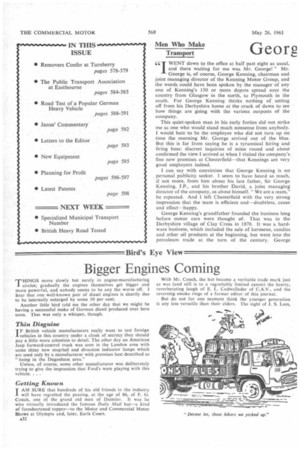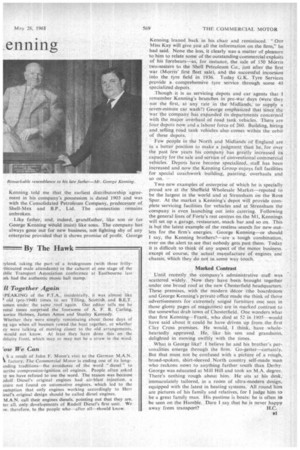Bigger Engines Coming
Page 34

Page 35

If you've noticed an error in this article please click here to report it so we can fix it.
THINGS move slowly but surely in engine-manufacturing .Icircles; gradually the engines themselves get bigger and more powerful, and nobody seems to be any the worse off. I hear that one well-known pair of diesel engines is shortly due to be internally enlarged by some 10 per cent.
Another little bird told me the other day that we might he having a successful make of German diesel produced over here soon. That was only a whisper, though.
Thin Disguise
T F British vehicle manufacturers really want to test foreign ▪ vehicles in this country under a cloak of secrecy they should pay a little more attention to detail. The other day an American Jeep forward-control truck was seen in the London area with some shiny new stop/tail and direction indicator lamps which are used only by a manufacturer with premises best described as " being in the Dagenham area."
Unless, of course, some other manufacturer was deliberately trying to give the impression that Ford's were playing with this vehicle. . .
Getting Known
AM SURE that hundreds of his old friends in the industry ▪ will have regretted the passing, at the age of 86, of F. G. Couch, one of the grand old men of Daimler. It was he who virtually introduced the famous Daily Mail hat—a kind of foreshortened topper—to the Motor and Commercial Motor Shows at Olympia and, later, Earls Court.
A32
With Mr. Couch, the hat became a veritable trade mark just as was (and still is to a regrettably limited extent) the hearty, reverberating laugh of E. L. Cadwallader of C.A.V., and the reversing smoke rings of a former editor of this journal.
But do not for one moment think the younger generation is any less versatile than their elders. The sight of J. S. Lees,
:yland, taking the part of a bridegroom (with three frillyiticoated male attendants) in the cabaret at one stage of the 'bile Transport Association conference at Eastbourne last :ek had the authentic music hall stamp.
II Together Again
1PEAKING of the P.T.A.. incidentally. it was almost like
old (pre-1948) times to see Tilling. Scottish and B.E.T. ismen under the same roof again. Our editor tells me he veral times surprised the foursome of A. F. R. Carling. aurice Holmes, James Amos and Stanley Kennedy.
Whether they were simply reminiscing about those days of ng ago when all busmen rowed the boat together, or whether ey were talking of moving closer to the old arrangements, would not know. At least they have done this on the iblicity front, which may or may not be a straw in the wind.
row We Can
S a result of John F. Moon's visit to the German M.A.N. V factory, The Commercial Motor is ending one of its longaiding traditions—the avoidance of the word "diesel" to scribe compression-ignition oil engines. People often asked ly we have refused to use the word. The reason was because idolf Diesel's original engines had air-blast injection, a ature not found on automotive engines, which led to the sumption that only engines working accordingly to Herr iesel's original design should be called diesel engines.
M.A.N. call their engines diesels pointing out that they are. ter all. only developments of Rudolf Diesel's first unit. We nv. therefore. to the people who--after all—should know.




















































































































